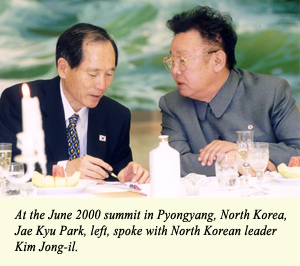


The most fortified border in the world divides the Korean Peninsula. But Jae Kyu Park, BA’67 (R), has a talent for crossing borders.
| “I’ve been fortunate enough over the years to be at the right place at the right time; and, luckily,
I have been able to make a contribution at those times.” — Jae Kyu Park |
|---|
As a young man, he ventured from his native South Korea across the globe to the New York metropolitan area, eventually studying at FDU’s Rutherford Campus.
As the president of Kyungnam University in Masan, South Korea, for the last two decades, he has led the development of partnerships and programs with institutions throughout the world.

And, as the minister of unification, he played a pivotal role in the historic North-South Korean Summit in 2000, which took a major step toward the reconciliation of the two estranged lands.
Park’s leadership in higher education and international relations has made him one of Korea’s most respected and influential individuals. In one lengthy profile, the Korea Times described him as an “iron hand in a velvet glove” because of his “gentle appearance” and “sturdy spirit.”
With his typical modesty, he is quick to deflect praise. “I’ve been fortunate enough over the years to be at the right place at the right time; and, luckily, I have been able to make a contribution at those times.”
Much has figured in this prominent man’s path, but luck hardly explains his remarkable string of achievements.
Coming to America
Born in Masan, which lies in South Kyongsang Province, Park lived in a remote fishing village, and he says education provided an “escape” to the city. By the time he entered Masan High School, he began to dream of going abroad. In 1963, he traveled to New York City and studied English at Columbia University’s language institute.
Park recalls the challenge of learning another language. “Pronunciation practice in particular was a wrestling match for my tongue — the clerks at the supermarket didn’t know if I was asking for soup or soap.”
Following a year in New York, Park enrolled at FDU. “I wanted to be close to New York, but in a cozier, more community-oriented place, something a bit more familiar and like home. Proximity, character and the people of Rutherford made ‘the Castle’ an ideal choice.”
“Pronunciation practice in particular was a wrestling match for my tongue — the clerks at the supermarket didn’t know if I was asking for soup or soap.” Park majored in international relations, and although he says he spent many late nights studying to keep up with his peers, he “enjoyed campus life immensely, and the hard work sure paid off.”
Park then received a scholarship to attend graduate school at the City College of New York (CCNY), where he began to develop a deep interest in North Korean studies, a passion he describes as his “lifetime assignment.” He later earned diplomas from the University of Exeter in England and The New School in New York and gained his PhD from Kyunghee University in South Korea.
Building a Global University
Upon his return to South Korea, Park put his studies on hold in order to complete his country’s mandatory military service. Fittingly enough, he was stationed with an army division that conducted information analysis on North Korea.
After military duty, Park began teaching at Kyungnam University, then a relatively small institution. Then, he established the Institute for Far Eastern Studies (IFES), which, declared the Korea Times, “became the Mecca of North Korean studies.”
The institute works to promote peace and the unification of Korea through scholarly projects focusing on the Korean Peninsula and Northeast Asia. Park says, “I am confident that IFES is the most active research organization in the area of Korea’s reunification and security.”
Park soon moved into the administration, becoming vice president of Kyungnam in 1982 and then landing the leadership role as president in 1986. Among other accomplishments, he has further extended the University’s global outreach. Kyungnam now has academic agreements with 43 universities in 15 countries, including the United States, Japan and Russia. These links include an English training and immersion program held each summer at Fairleigh Dickinson University.
The institution, which last year celebrated its 60th anniversary and has more than 15,000 students, also is recognized for excellence in vocational education and its alliances with the local region and industry.
Perhaps above all, the University has gained widespread recognition for its work in the area of North Korean studies. Building on the work of the Institute for Far Eastern Studies, Park and Kyungnam created the Graduate School of North Korean Studies, which he says is designed to provide “expert knowledge on North Korea and inter-Korean relations” and to equip students “with the practical training and theoretical knowledge that will help them play active roles in future peacemaking and unification processes.” Expanded in 2004 to the University of North Korean Studies, this is the only recognized graduate school in the world specializing in North Korean affairs and Korea’s reunification issues.
FDU Magazine Home | Table of Contents | FDU Home | Alumni Home | Comments
©Copyright 2007 Fairleigh Dickinson University. All rights reserved.
For a print copy of FDU Magazine, featuring this and other stories, contact Rebecca Maxon, editor, 201-692-7024 or maxon@fdu.edu.